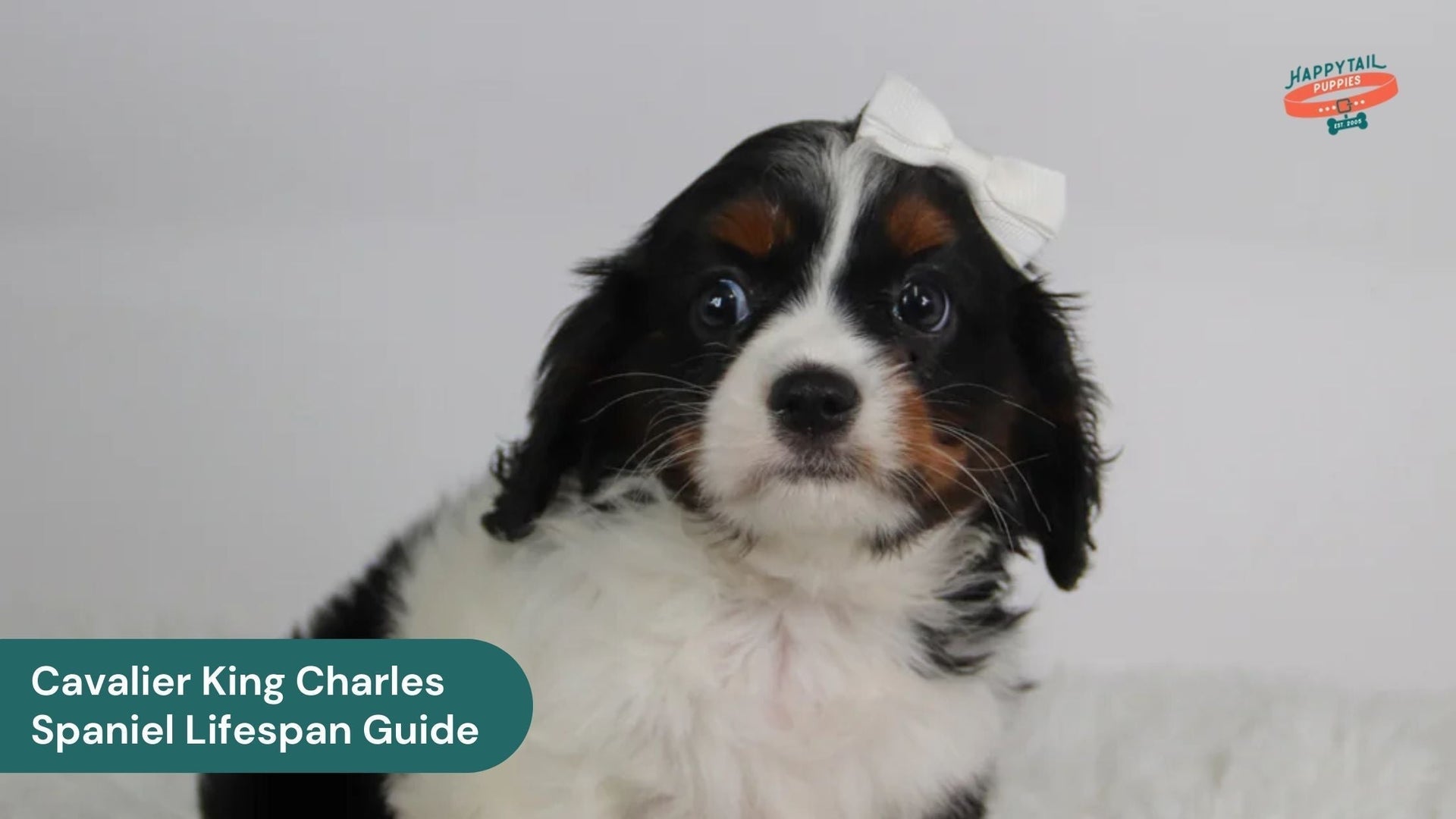The Ultimate Guide to Your Cavalier King Charles Spaniel’s Life Expectancy
The Cavalier King Charles Spaniel lives 7-14 years. Maximize their longevity by prioritizing ethical breeding, MVD screening, and proactive care. Learn expert tips on diet, exercise, and veterinary monitoring to ensure your Cavalier enjoys a long, healthy life.
🐾Table of Contents
- The Cavalier King Charles Lifespan: Quick Facts at a Glance
- Key Factors That Extend Longevity
- The Genetic Truth: Understanding Hereditary Risks and Longevity
- Expert Care for a Longer, Healthier, HappyTail Life
- HappyTail Breeder Insights: Selecting for Longevity
- Your Future with a Cavalier: Responsible Puppy Buyer Guidance
- Conclusion
Cavalier King Charles Spaniel is the only one or two breeds that find their way into hearts. Their tender disposition, their kindly eyes, and their undyingly faithful service make them beloved pets of all the world. Generally, this breed has a life span between 7 and 14 years on average, subject to the kind of care given to them, their genetic composition, and with affection.
Even though the issues with the heart are only a portion of the breed story, proactive health care and responsible breeding give the breed an extra few years to live. We assist families in raising their pups at HappyTail Puppies to live healthier and full-of-love lives. Now, then, we observe the several factors that dictate the Cavalier King Charles' life expectancy.
The Cavalier King Charles Lifespan: Quick Facts at a Glance
We are already aware that Cavalier King Charles Spaniel generally lives 9-14 years, so many of them live longer when provided the necessary care. Some studies that indicate improved awareness and evolution of the vet reveal a median lifespan of approximately 11.3 years. The recent study by the VetCompass Programme at the Royal Veterinary College (RVC) shows that lifespan data indicate that thousands of Cavaliers can live longer lives if they are carefully bred and monitored.
The most influential ones are the care quality and genetics. Cavalier King Charles Spaniel life expectancy improves whenever the proprietors are dedicated to proactive healthcare, emotional health, and preventive screenings. HappyTail emphasizes the importance of realistic expectations, beginning with making the best decisions, including selecting pups with ethical breeders with a focus on heart health and clear genetics.
Key Factors That Extend Longevity
- Ethical Breeding: Genetic dangers become significantly minimised by breeding through healthier and screened parent dogs. The concerned breeders usually screen for mitral valve diseases and other related genetic problems before proceeding with the pairing.
- Proactive Veterinary Care: Regular health check-ups, early diagnoses, and routine preventive treatments can be used to extend the life of the pup. The detection of heart murmurs or any problems with teeth at an earlier stage will guarantee prompt comfort and response.
- Weight Management: Physical exercise and a nutritious diet can prevent obesity, not to mention that they help take the burden off their joints and cardiovascular system. Maintaining an ideal body weight can be used to enhance the vitality of your pup and increase the number of their active years.
The Genetic Truth: Understanding Hereditary Risks and Longevity
-Heart Health: MVD or Mitral Valve Disease is the most widespread concern with this breed, which begins to manifest itself with aging. The risks can be significantly reduced by early screening with the assistance of echocardiograms and the choice of pups using tested parents.
- Neurological Disorders: Syringomyelia is a rare disease that affects the spinal cord and results in hyperirritability, which results in pain. This problem is usually exhibited by Cavaliers, but the same is seen in other related breeds like the Cocker Spaniel. MRI screening of reputable breeders helps prevent transmission; this way, future generations are not exposed to the diseases, and longevity is directly encouraged.
- Eye Conditions: Cataracts and retinal dysplasia are inherited eye disorders that usually influence the vision of the Cavalier breed. Most of the concerned breeders carry out ophthalmic checks to ensure that eye health in this breed is maintained.
- Hip and Joint Health: Sometimes hip dysplasia and patellar luxation take place. Mobility problems can be minimized by maintaining an ideal weight and providing joint-supportive nutrition.
- Ear Infections: The Cavaliers are very attractive because of their long, silky ears, but they get chronic ear infections. Their ears will stay healthy by cleaning regularly and managing airflow to prevent the recurrence of inflammation and discomfort.
Expert Care for a Longer, Healthier, HappyTail Life
To care for a Cavalier King Charles Spaniel, you need to understand both love and science. The steps we have mentioned here include expert insights along with regular routines that support an active and joyful life.
Balanced Nutrition for Vitality
It is possible to extend the life of your pup by feeding him or her a balanced diet. Ensure that they incorporate good-quality proteins, important vitamins, and omega-3 fatty acids. Cavaliers are known to gain weight easily; hence, they should not be given too many treats or fillers. One should also add fresh vegetables, lean meat, and grain-free foods, which are also vet-approved.
Other nutrients that are necessary to promote the health of the joints and the heart are taurine and glucosamine. Comparing it with other breeds such as the Cavalier King Charles Spaniel vs Cocker Spaniel, the diet is a fundamental common ground; the amount of portions and the balance of nutrients vary slightly, namely based on their structure and metabolism.
Being a good pet owner, you should consider the sizes, as well as the amount of feeding that the Cavalier receives, on a regular basis, depending on the age, metabolic rate, and activity rate of the pet.
Regular Veterinary Monitoring
Wellness checks, which are conducted every six months, would help to identify health concerns early in case of any. The older vets assess the heart activity, dental health, and ensure weight stability. According to the American Veterinary Medical Association (AVMA), the annual assessment of vets significantly increases the early detection of diseases, leading to healthier, longer lives for pets.
Having your pup do bloodwork and diagnostic imaging once a year will show you every tiny change that happens in advance of the development of the disease. Preventing diseases through vaccinations against different illnesses, scaling teeth, and preventing parasites can help maintain their long-term health. It is always good to visit a good vet to be aware of the dangers the breed poses.
A properly structured history of all medical visits can assist in tracking tendencies and, thus, enhance the overall quality of life of Cavalier due to the time-proven proactive care.
Exercise and Mental Stimulation
Cavaliers also enjoy taking walks, playing fetch, and keeping busy with puzzles or interactive toys that will keep them active and stimulated with their intelligent minds. Their cardiovascular strength is always in good shape by keeping it regular, and obesity is avoided.
This carefree breed is developing well based on companionship, and joint exercise can be embraced to enhance the bond between the pups and their owners. The same applies to other related breeds such as Teacup Shih Tzu, since a medium level of activities contributes to maintaining their heart system and emotional stability.
The cavaliers are active both mentally and physically because they exhibit less depression, destructive habits, and anxiety, which predisposes them to a jubilant and steady temperament.
Dental Health and Hygiene
The life of a pup directly depends on dental care. Cavaliers are also susceptible to periodontal diseases, which usually result in systemic infections that affect their kidneys and heart negatively.
When choosing Cavalier King Charles Spaniel puppies, it is always better to choose breeders who begin the dental desensitization earlier and promote positive handling programmes. The oral hygiene of your pup should be kept clean, and pet owners should start at a very early stage when the puppy is young, so as to create a habit that could last a lifetime.
Clean air, healthy gums, and healthy teeth enhance your pup's comfort and enable them to chew and absorb nutrients more quickly. Dental practices are used to increase their lifespan and prevent bacterial shortening.
Grooming and Skin Care
You can keep your pup healthy and happy as a pet owner by grooming them on a regular basis. Their smooth coat should be properly brushed regularly, which would avoid skin irritations and matting. Use vet-approved dainty shampoos to keep your puppy moist and shiny. The problems can be avoided by ensuring that their ears are checked regularly, their nails are trimmed, and their paws are checked too.
Communicating with your pup through grooming is the most appropriate method to connect with them and win their trust. Examine their skin to determine whether they are allergic to anything or have parasites.
Regular care and awareness of dog grooming trends show responsible ownership, which helps your pup achieve its vitality and health in accordance with the philosophy of the HappyTail expert care.
Emotional Health and Social Bonds
Cavaliers are loving and caring furry friends that become successful when they are given attention and love. If you leave your pups with your Cavalier more often, you might develop separation anxiety, other behavioral disturbances, and stress. You should also take them into your family, touch them with love, with little things that help to soothe them.
In the eyes of the American Kennel Club (AKC), dogs receiving regular emotional contact or social interaction become less anxious, and they generally grow healthier.
HappyTail Breeder Insights: Selecting for Longevity
- Genetic Screening: Parent dogs undergo extensive testing to determine mitral valve disease, patellar health, and eye conditions, which means that pups will inherit better, healthier genes.
- Transparency Standards: Breeders provide all medical records and family histories that instill confidence and responsibility, besides informing buyers with objective and lucid health chronicles.
- Early Socialization: The interactions are usually organized, and through these interactions, the puppies gain calm temperament and emotional fortitude, which are the traits that are fundamental and relevant in the long-term well-being and flexibility in family life.
- Ethical Pairing: Selective breeding is a good way to ensure the breed has genetic diversity that reduces the risk of hereditary disease and further enhances the breed's vitality through scientifically informed breeding decisions.
- Lifetime Support: HappyTail breeders are your lifelong partners. We provide management tips, assist in networking you with the vet, and provide nutritional consultation, which would allow your Cavalier to lead a healthier, longer, and happier life.
Your Future with a Cavalier: Responsible Puppy Buyer Guidance
There are two primary duties that the owners of Cavalier King Charles Spaniels owe: devotion and duty. Such breeds become your best friends who grow better with care and great affection. Imagine those ordinary cuddlers, those impatiently waiting eyes, and that not-shaken story of love that reminds us of the special happiness the breed offers.
Cavaliers require time, contacts, and intellectual stimulation. The longer period of time they stay alone makes them lose their emotional balance. The accountable owners make the finest space full of play, patience, and embodiment that will bring lifetime stability, besides happiness.
The essential thing is to remain economically viable. Regular check-ups, nutritious food of high quality, and potential health interventions must be effectively budgeted and anticipated. A superior peace of mind is provided by pet insurance. You have a happy and loyal life with your love and devotion. That is what determines the experience in HappyTail.
Conclusion
Although the Cavalier King Charles Spaniel has some health issues, with proper breeding and good care, their life span is good. Preventive care, ethical choice, and daily love should be prioritized to reduce the possibilities of risks to realities that can be managed. Through professional advice on how to follow HappyTail, each owner will have the resources and the heart to give a complete, happy life.
Are you prepared to embrace a healthy and long-lived friend into your heart? Know more about how well you can raise Cavalier King Charles Spaniel puppies today and start a lifelong friendship built on care, trust, and happiness.
Frequently Asked Questions
Do all Cavalier King Charles Spaniels get heart disease?
Heart disease is not common in every Cavalier. Also, being genetically inherited, responsible breeding delays the onset of the disease. Detecting the issue sooner, routine cardiac screening, and on-time medication allow the Cavaliers to live longer, more comfortable lives.
What is the shortest lifespan reported for a Cavalier?
Reportedly, the shortest lifespan a Cavalier has is nine years, which is often connected to the onset of mitral valve disease and lack of proper breeding practices. The Cavaliers, which are bred ethically with appropriate care, live well past fourteen years.
Does diet affect a Cavalier's life expectancy?
Absolutely! Diets play an integral part here. Maintaining an optimal weight, offering them heart-supportive, low-sodium meals can improve their longevity, making diet one of the highly controllable lifespan factors.
Is it better to get a male or female Cavalier for a longer life?
Studies show that females might have to live a bit longer, but the differences are not many. Responsible breeding practices, genetics, consistent shower of love, and proactive vet care influence their longevity.
How can I tell if a Cavalier breeder is screening for MVD?
Ensure to get a written proof of board-certified cardiologist clearance apt for parents following the age of two and a half. The responsible breeders share certificates openly emphasizing heart-health screenings as a part of the entire breeding ethics.


